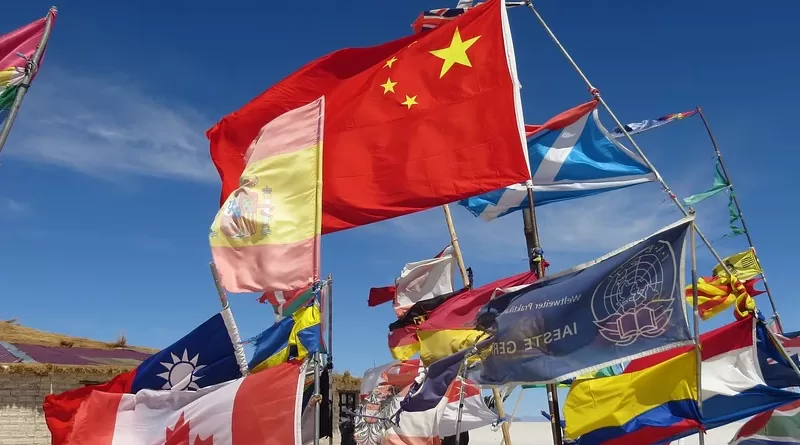China’s Quiet Diplomacy Behind The ‘Wolf Warriors’ – Analysis
By Connor Fiddler*
When thinking about Chinese foreign policy, it is not unusual to conjure up images of stoic generals or ‘wolf warrior’ diplomats bent on representing their country’s nationalistic pride.
Even if this picture is not inaccurate, it is incomplete. While China’s Ministry of Foreign Affairs (MFA) conducts traditional state-to-state diplomacy, the lesser-known International Liaison Department (ILD), a foreign policy agency under the direction of the Chinese Communist Party’s (CCP) Central Committee, conducts ‘quiet diplomacy’.
Formed in 1951, the ILD is responsible for party-to-party diplomacy. Historically that almost exclusively meant foreign communist parties, but today it includes parties of varying ideologies. While often neglected by Western media, the ILD is a critical Chinese foreign policy institution that needs to be understood and studied.
During the early years of the People’s Republic of China, the ILD mainly focussed on maintaining good relations with other communist parties, particularly the Soviet Union. The ILD slowly became a professional foreign policy institution with a variety of influential communist and socialist contacts, not only in the Soviet Union but also in North Korea, Vietnam, Laos, Japan, Indonesia, Burma and Thailand.
When the Cultural Revolution started in 1966, the ILD’s role transformed from a traditional diplomatic institution to a revolutionary organisation. Eventually, the ILD leadership was purged and replaced by military generals. Formal relations with foreign parties plummeted from around 85 to just 10. ILD staff went from a high of around 1100 personnel to about 300.
When China embarked on economic reform and began to open up to the world in the 1980s, the ILD was rehabilitated and given a new mandate. The ILD expanded its contacts beyond communist parties to include liberation movements in Africa, European social democratic parties and various populist parties. As the reform era matured, the ILD was tasked with assisting the CCP in economic modernisation.
While the CCP may not have relied solely on the ILD, it did play an essential function in Chinese diplomacy.
Under General Secretary Xi Jinping, the ILD has added a new mission to its repertoire — supporting China’s great rejuvenation. Xi’s great rejuvenation campaign is an all-of-society push toward developing a modern China. There are many components to Xi’s great rejuvenation, one of the most important being his signature Belt and Road Initiative (BRI).
To assist the CCP, the ILD uses its foreign contacts to build support for BRI projects in foreign countries. In the lead-up to the 100th anniversary of the CCP’s founding, the current director of the ILD, Song Tao, published a lengthy article outlining the core mission of the ILD in the modern era. While the obligatory CCP slogans and bromides were employed, only one project was directly referenced — the BRI.
Song stated that the CCP’s external work must ‘establish a political party consultation mechanism with key countries along the Belt and Road to further consolidate the consensus [between] ruling and opposition parties in countries along the route to promote [its] high-quality development’.
These ‘consultation mechanisms’ do not just include communist and socialist parties. In June, the ILD established one of these mechanisms with nine mainstream political parties in Tunisia. In December of last year, Song hosted a conference promoting the BRI that comprised many representatives including four former prime ministers, one being former Australian prime minister Kevin Rudd.
There are indications that the ILD’s new tactic is working. Just ten days after attending Song’s December conference, former Egyptian prime minister Essam Sharaf indicated his continued support for BRI projects within Egypt by stating that the BRI had achieved ‘great successes’.
Co-opting foreign elites is an effective method for the ILD to promote the BRI. By creating demand for infrastructure projects across a broad swath of political parties, the ILD is better serving the foreign and economic interests of the CCP. No longer does the ILD maintain contacts with only communist and socialist parties. Indeed, the organisation’s drift away from ideological rigidity makes it a more potent force in party-to-party diplomacy.
The prominence given to the ILD within the CCP leadership was highlighted when in July Xi Jinping delivered his Keynote Address at one of the ILD’s most renowned events, the CCP and World Political Parties Summit. The summit underscores how far the ILD has come.
During the Cultural Revolution, the ILD held formal relations with only ten countries — this July’s summit gathered the leaders of more than 500 political parties and organisations from over 160 countries. The ILD has recreated itself into a diplomatic powerhouse after it was crippled during the Cultural Revolution.
While the ILD may not receive the same funding as the Chinese military, nor the ostentatious New York Times profiles written about MFA diplomats, it still plays an essential role in Chinese foreign policy. Its work is crucial to CCP strategy.
From pursuing Mao’s global revolution, to attracting foreign direct investment for Deng Xiaoping’s market reforms and drumming up international support for Xi Jinping’s Belt and Road Initiative, the International Liaison Department should be seen as a critical Chinese foreign policy institution.
*About the author: Connor Fiddler is a graduate student at the Elliott School of International Affairs, George Washington University.
Source: This article was published by East Asia Forum


[Mao’s global revolution] – where did that come from; cnn, nyt, wapo etc ???